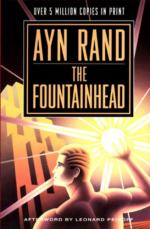|
|
The Fountainhead Part 2, Chapter 9
Seven-year-old Ellsworth Toohey sprays Johnny Stokes, a bully, with a garden hose. He does it apparently to avenge an injustice, and he is sent to bed without dinner. Somehow he tacitly rules the house, even though his father, a shoe store manager, doesn't willingly participate in being ruled. His mother adores Ellsworth because he is frail and weak, and she thinks being willing to love him raises her spiritual stature.
In school, Ellsworth works hard and is a model student; he does what people expect better than anyone else. The other kids don't quite know what to do with him, and they keep their distance. His mother is very proud of him on two specific occasions. The first, was when Ellsworth was invited to two birthday parties, one for a boy who was popular, and the other for a boy who was unpopular. Ellsworth was the only one who was invited to both and accepted the unpopular boy's invitation. For weeks, the popular boy was teased because of his choice. The second, was when one of the best students in the class offered Ellsworth a bag of jelly beans in return for looking at his test. He agreed, but then a week later went to the teacher with the jelly beans and confessed. He did not tell her the name of the other boy, which cast suspicion on all of the smartest boys in the class.
Ellsworth's mother dies and his aunt comes to live with them. When he is older, he becomes interested in religion; boys who are ill or suffering in some way come to his house for comfort - he is able to convince them that suffering is good. Soon he discovers socialism, and in studying it develops a gentle demeanor, and people start to like him more. When he goes to Harvard, he preaches that people should forego their egos, and give up their souls so that they can be truly selfless. He has a large following of rich boys. When he graduates, he goes to New York and does a variety of things, including vocational counseling (where he counsels young people to give up the things they are passionate about) and book reviewing (where he has high praise for plot-less hero-less books that deal with suffering or the masses).
In 1921, Catherine Halsey, his niece, comes to live with him. In 1925, he publishes Sermons in Stone, which makes him famous and leads him to write a column, titled Once Small Voice, in the New York Banner. His column preaches selflessness, kindness, pity, and equality. He starts a club of Wynand employees, as well as the Council of American Writers, the Council of American Builders, and the Council of American Artists. No one believes him to be dangerous at all; he smiles and says he's the most dangerous man they've ever met.




